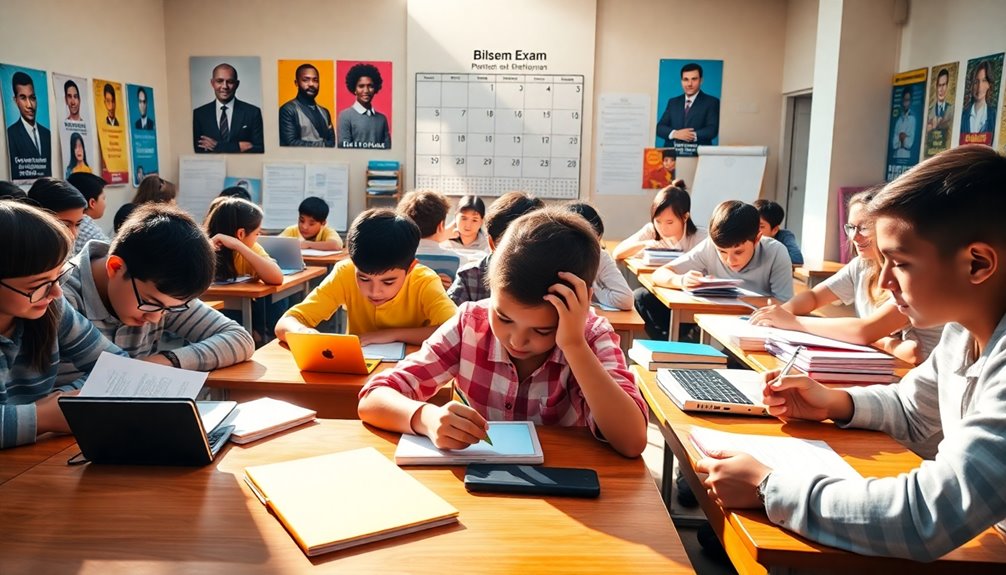Are you ready for the BILSEM exam? Understanding your emotional intelligence is key to boosting your academic performance. Balancing your self-view as a gifted student can greatly affect your results. Set realistic goals, reflect on your feelings regarding the gifted label, and connect with peers for support. Additionally, enhance your emotional regulation skills to tackle exam stress. Get ready to access strategies that can elevate your preparation and help you thrive during the exam!
Key Takeaways
- Enhance your emotional intelligence to improve academic performance and manage exam-related stress effectively.
- Familiarize yourself with the Perceptions of Gifted Label Scale (PGLS) for better self-understanding.
- Engage in self-reflection to assess your feelings about being labeled as gifted.
- Develop emotional regulation skills to help you handle pressure during the exam.
- Utilize resources focused on social skills to foster supportive connections with peers and mentors.
Understanding the Gifted Label and Its Impact

Understanding the gifted label and its impact is essential, especially since it shapes how children view themselves and how others perceive them. When you label your child as gifted, it can boost their self-perception, especially if you and their friends reinforce that belief.
However, gifted kids often find themselves caught between expectations from adults and their social experiences. While they might score average on perceptions from parents and teachers, they tend to have a higher self-image among friends. This discrepancy can lead to social isolation, despite being accepted by peers.
Gifted children often navigate conflicting expectations from adults and peers, leading to a unique blend of self-image and social isolation.
Furthermore, the Pygmalion effect shows that teachers' expectations can further influence performance, adding pressure and emotional challenges.
Ultimately, steering through this label requires a delicate balance for emotional well-being.
The Role of Emotional Intelligence in Academic Success

Gifted children often face unique challenges that impact their academic journey, and emotional intelligence plays a significant role in maneuvering these hurdles. By recognizing, expressing, and regulating emotions effectively, you can enhance your resilience and adaptability.
Studies show that high emotional intelligence correlates with better academic performance and positive peer relationships. However, many gifted children struggle with self-consciousness, which can negatively affect their perception of being gifted.
Understanding your emotional functioning is crucial; targeted support in areas like empathy can boost your overall emotional health. By developing your emotional intelligence, you not only improve your academic success but also enrich your social-emotional development, setting the stage for a fulfilling educational experience. Additionally, recognizing the importance of emotional neglect can help you navigate relationships more effectively.
Strategies for Balancing Academics and Emotional Well-Being

While preparing for the BILSEM exam, finding a balance between academic demands and emotional well-being is essential for success.
Recognizing and regulating your emotions can boost resilience and adaptability. Here are some strategies to help you maintain this balance:
- Set realistic goals: Break your study sessions into manageable tasks to reduce pressure and avoid burnout.
- Practice self-reflection: Regularly assess your feelings and thoughts about your gifted label to enhance self-esteem and emotional functioning.
- Cultivate connections: Engage with peers and mentors to foster a support system that can alleviate feelings of isolation.
Insights From Recent Research on Gifted Children

Recognizing the emotional landscape of gifted children can greatly enhance your preparation for the BILSEM exam. Recent research reveals that gifted children often perceive themselves more positively than their peers, but self-consciousness can negatively impact their self-view. Emotional intelligence plays a vital role in their resilience and academic success, with girls typically scoring higher in empathy and social skills. Understanding these emotional dynamics can guide your approach. Additionally, fostering emotional support can significantly improve their overall performance and well-being.
| Key Findings | Emotional Impact | Gender Differences |
|---|---|---|
| Average perception by adults | Self-consciousness reduces self-view | Girls excel in empathy |
| Positive self-perception | Emotional intelligence aids resilience | Boys may struggle socially |
| Importance of emotional support | Better relationships enhance performance |
Preparing for the BILSEM Exam: Tips and Resources

To excel in the BILSEM exam, it's crucial to enhance your emotional intelligence, as studies show it's linked to better academic performance and resilience.
Familiarizing yourself with the Perceptions of Gifted Label Scale (PGLS) can help you understand how perceptions of giftedness influence motivation.
Here are some tips and resources to aid your preparation:
- Engage in activities that boost self-understanding and risk-taking abilities.
- Utilize resources that promote social skills and emotional regulation.
- Collaborate with peers and family to create a supportive study environment.
Additionally, developing emotional regulation skills can significantly improve your ability to manage stress during exams.
Frequently Asked Questions
How Can Parents Support Their Gifted Child's Exam Preparation?
To support your gifted child's exam preparation, you can create a structured study schedule that balances challenging materials with breaks.
Encourage them to explore their interests deeply and provide resources that stimulate their curiosity.
Regularly communicate about their progress and feelings, fostering a positive environment.
You might also consider connecting them with peers or mentors who share similar passions.
Celebrating their achievements, no matter how small, can boost their confidence and motivation.
What Are Common Signs of Anxiety in Gifted Children?
When you notice signs of anxiety in gifted children, it can often manifest as perfectionism, frequent stomachaches, or trouble sleeping.
They might avoid challenging tasks or become overly critical of themselves.
You may see them withdrawing from social situations or expressing feelings of overwhelm.
It's important to pay attention to these signs, as they indicate your child might need support to manage their emotions and navigate their academic pressures effectively.
How Can Mindfulness Techniques Help During Exam Preparation?
Mindfulness techniques can greatly ease your exam preparation. By practicing deep breathing, you'll calm your nerves and sharpen your focus.
When you engage in meditation, you'll enhance your concentration and reduce stress.
Visualization exercises help you picture success, boosting your confidence.
Taking short breaks to practice mindfulness keeps your mind fresh and prevents burnout.
Incorporating these strategies into your routine can create a more balanced approach, making you feel more prepared and relaxed during exams.
What Role Does Peer Support Play in Preparing for BILSEM?
Peer support plays an essential role in your exam preparation. When you study with friends, you can share resources, quiz each other, and tackle challenging concepts together.
This collaboration boosts your motivation and keeps you accountable. Plus, discussing topics with peers can deepen your understanding and reveal different perspectives.
Don't underestimate the power of a study group; it can make the process more enjoyable and less stressful, ultimately enhancing your performance.
Are There Specific Resources Tailored for Gifted Students' Emotional Needs?
Yes, there are specific resources designed to address gifted students' emotional needs.
You can explore counseling services that focus on emotional intelligence and coping strategies. Online communities and forums also provide a space for you to connect with peers facing similar challenges.
Books and workshops tailored for gifted individuals often emphasize emotional well-being, helping you navigate stress and anxiety.
Utilizing these resources can enhance your overall emotional health and support your academic journey.
Conclusion
As you gear up for the BILSEM exam, remember that emotional intelligence can be just as essential as academic skills. Did you know that nearly 70% of gifted children struggle with anxiety? This statistic highlights the importance of nurturing your emotional well-being alongside your studies. By finding a balance between academics and self-care, you can boost your performance and thrive. Stay focused, and don't underestimate the power of your emotions in this journey!









